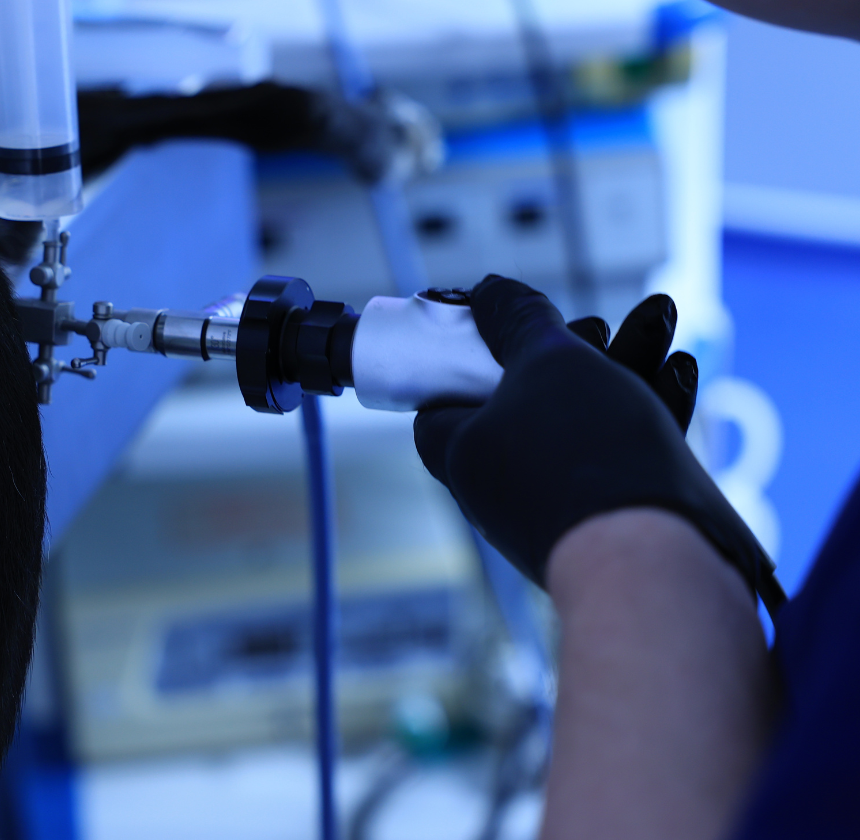Colonoscopy
We understand the importance of maintaining your pet’s digestive health, and our advanced veterinary services, including colonoscopy, are designed to provide comprehensive care tailored to your furry companion’s needs.
Conditions Diagnosed & Treated with Colonoscopy
Veterinary colonoscopy is a specialised procedure that allows us to examine the colon (large intestine) and rectum of your pet using a flexible endoscope. This minimally invasive technique provides detailed visualisation of the intestinal lining, enabling us to diagnose and treat various gastrointestinal conditions effectively.
Inflammatory Bowel Disease (IBD)
IBD is a group of chronic inflammatory disorders affecting the gastrointestinal tract. Colonoscopy allows us to visualise the intestinal lining and obtain biopsy samples for histopathological evaluation, aiding in the diagnosis and management of IBD in pets.
Colitis
Colitis refers to inflammation of the colon, which can result in symptoms such as diarrhea, bloody stool, and abdominal discomfort in pets. Colonoscopy helps veterinarians assess the extent and severity of colitis, identify potential causes such as infections or dietary issues, and guide treatment decisions.
Polyps and Tumours
Colonoscopy enables the detection and characterisation of polyps, benign growths, or tumours within the colon or rectum of pets. Biopsy sampling during colonoscopy allows for histopathological analysis to determine the nature of the growth and guide further management, including surgical removal or medical therapy.
Parasitic Infections
Certain gastrointestinal parasites, such as intestinal worms or protozoa, can cause inflammation, ulcers, or other abnormalities in the colon of pets. Colonoscopy allows us to directly visualise the presence of parasites, assess the extent of infestation, and obtain samples for diagnostic testing and treatment.
Chronic Diarrhoea
Chronic diarrhoea in pets can have various underlying causes, including dietary intolerances, infections, inflammatory conditions, or neoplasia. Colonoscopy helps us evaluate the colonic mucosa, identify abnormalities contributing to diarrhoea, and formulate targeted treatment plans to manage the underlying condition effectively.
Rectal Bleeding
Rectal bleeding or hematochezia may occur due to several gastrointestinal disorders, including colonic ulcers, inflammatory lesions, or neoplastic growths. Colonoscopy allows for direct visualisation of the rectal mucosa, identification of bleeding sources, and appropriate interventions such as cauterisation or biopsy sampling.
Foreign Body Ingestion
Pets may ingest foreign objects that become lodged in the gastrointestinal tract, leading to obstruction, inflammation, or injury. Colonoscopy aids in the detection and retrieval of foreign bodies from the colon or rectum, avoiding the need for invasive surgical procedures in many cases.
Chronic Constipation
Chronic constipation or obstipation in pets can result from various factors, including dietary issues, anatomical abnormalities, or motility disorders. Colonoscopy helps evaluate the colonic mucosa, identify obstructive lesions or strictures, and guide treatment strategies to alleviate constipation and improve gastrointestinal function.
Colonoscopy Procedure
The veterinary colonoscopy procedure in pets involves several steps to safely and effectively examine the colon (large intestine) and rectum using a flexible endoscope. Here’s an overview of the typical veterinary colonoscopy procedure.
Pre-procedure Preparation
Before the procedure, the pet may need to undergo fasting for a certain period to ensure the colon is clear of food material. This helps improve visualisation during the colonoscopy. In some cases, the pet may also receive a laxative or enema to further cleanse the colon.
Anaesthesia or Sedation
Colonoscopy in pets requires general anaesthesia to keep the animal still and comfortable throughout the procedure. We will select an appropriate anaesthetic protocol based on the pet’s health status, age, and other factors. Intravenous catheters may be placed to administer medications and fluids during the procedure.
Colonoscopy Procedure
Once the pet is anaesthetised, they are positioned on their side or back on the surgical table. The tail may be gently taped or secured to provide better access to the rectum.
We will carefully insert a flexible colonoscope into the pet’s rectum and advance it through the colon. The colonoscope is equipped with a camera, light source, and channel for passing instruments or obtaining biopsy samples.
As the colonoscope is advanced, we will visually examine the lining of the colon and rectum in real-time. They look for abnormalities such as inflammation, ulcers, polyps, tumours, or signs of infection. Images from the colonoscope are displayed on a monitor for the veterinary team to assess.
If abnormal tissue is detected, we may use specialised instruments passed through the colonoscope to obtain biopsy samples. Biopsies are collected from suspicious areas for histopathological analysis to determine the underlying cause of gastrointestinal abnormalities.
Post-Procedure Care
Once the colonoscopy is complete, the colonoscope is carefully removed, and any instruments are withdrawn. The pet is monitored closely as they recover from anaesthesia. Postoperative pain management and supportive care are provided as needed to ensure the pet’s comfort and well-being.
Colonoscopy Benefits in Pets
Overall, veterinary colonoscopy offers a safe, effective, and minimally invasive approach to diagnosing and managing gastrointestinal disorders in pets. By providing accurate diagnosis, targeted treatment, and improved patient outcomes, colonoscopy plays a vital role in maintaining the digestive health and well-being of companion animals.
Accurate Diagnosis
Provides a direct view of the colon to identify issues like inflammation, tumours, ulcers, or polyps.
Minimally Invasive
Avoids the need for exploratory surgery, reducing recovery time and discomfort.
Targeted Sampling
Enables precise collection of tissue biopsies for diagnosing gastrointestinal disorders.
Early Detection
Identifies colon diseases like cancer or colitis at an early stage for timely treatment.
Therapeutic Applications
Facilitates the removal of foreign objects or polyps directly.
Chronic Conditions
Monitoring helps track the progression and effectiveness of treatments for conditions like inflammatory bowel disease (IBD).

